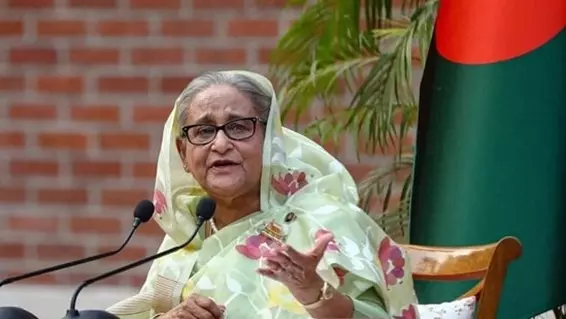
Bangladesh on edge, tightens security ahead of tribunal’s verdict against Hasina
Bangladesh is on high alert ahead of the ICT-BD verdict against Sheikh Hasina on crimes against humanity charges, as calls grow for her extradition from India

Security agencies are on high alert in Bangladesh, ahead of a special tribunal’s verdict in a case against deposed Prime Minister Sheikh Hasina, over alleged crimes against humanity committed during the anti-government protests last year.
"The law enforcement agencies have already completed their necessary preparations,” to prevent any unpleasant events across the country, home adviser Jahangir Alam Chowdhury was quoted as saying by the state-run BSS news agency.
ICT-BD's verdict
Bangladesh’s International Crimes Tribunal (ICT-BD) is set to deliver the verdict against 78-year-old Hasina on November 17.
Also Read: Yunus warns of attempts to derail Bangladesh elections
Hasina, her home minister Asaduzzaman Khan Kamal and then Inspector General of Police (IGP) Chowdhury Abdullah Al-Mamun have been accused of committing crimes under five counts, with the first one alleging the defendants of murder, attempted murder, torture, and other inhumane acts.
They were tried in the tribunal. The ex-premier and Kamal were tried in absentia, with the court declaring them fugitives. Mamun faced the trial in person but emerged as a state witness.
'Death penalty for Hasina?'
According to a UN rights office report, up to 1,400 people were killed between July 15 and August 15 last year (dubbed as the July Uprising), as Hasina's government ordered a security crackdown on protesters.
Chief prosecutor Mohammad Tajul Islam has demanded the death penalty for Hasina, alleging that she was the "mastermind and principal architect" behind the crimes against humanity committed during the mass protests last year.
Also Read: Storm rages over Awami’s ‘silent aid’ as Islamists sweep Bangladesh varsity polls
Hasina's supporters have said the charges against her were politically motivated.
The tribunal, on October 23, concluded the hearing on the case after over 28 working days, when 54 witnesses testified before the court describing how efforts were made to tame last year’s student-led movement that toppled Hasina’s now disbanded Awami League government on August 5, 2024.
Will India extradite Hasina?
Hasina fled Bangladesh on August 5 last year amid escalating unrest and is currently residing in India. Kamal reportedly also took refuge in the neighbouring country.
The interim government led by Muhammad Yunus has sought Hasina's extradition, but India has yet to respond to the request. Hasina faces multiple cases in Bangladesh following her ousting. Hasina and the two others were accused of committing crimes under five counts, with the first one alleging the defendants of murder, attempted murder, torture, and other inhumane acts.
Also Read: How Sheikh Mujib’s six-point charter became a clarion call for liberation
The second count accused Hasina of ordering the killing of protesters. Under the third count, she was accused of making inflammatory remarks and ordering the use of deadly weapons against protesting students.
Under the rest of the counts, the defendants were charged with the shooting and murder of six unarmed protesters, including students in Dhaka and its suburbs.
Awami Party blames ICT-BD
In several recent interviews with major international news outlets and the Indian media, Hasina called the ICT-BD a “kangaroo court” run entirely by men linked to her political opponents.
UK-based leading law firm Doughty House Chambers recently submitted an “urgent appeal” to the UN, saying Hasina was being tried in “an environment charged with political vengeance, under an unelected interim government with no democratic mandate”.
Also Read: Why should Sheikh Hasina submit to a sham tribunal in Bangladesh?
Last month, the Awami League filed a petition with the Hague-based International Criminal Court, accusing the Yunus-led interim administration of crimes against humanity, including killings and arbitrary arrests of its members.
The ICT-BD was formed by the past government to try hardened collaborators of the Pakistani troops during Bangladesh's 1971 Liberation War, when Tajul appeared as a key lawyer to defend the accused. Yunus's administration amended the ICT-BD law to try the leaders of the past regime, including Hasina, appointing Tajul as its Chief Prosecutor. Most Awami League leaders and key figures of the past government are now in jail or on the run at home and abroad.

